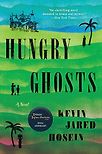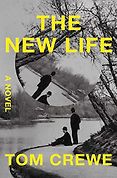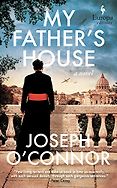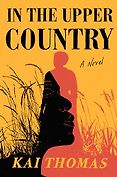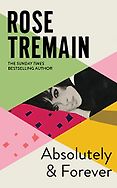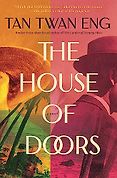Let me begin our discussion of the six historical novels shortlisted for the 2024 Walter Scott Prize by asking you, the chair of the judging panel, whether it has been a good year for historical fiction?
It’s been a wonderful year for historical fiction. We had an exciting longlist and had to make some really difficult decisions to get to this shortlist. But six is enough for a shortlist.
What do the Walter Scott Prize judges look for in a historical novel?
Our criteria are very important to us. It’s not just about what we, as individuals, like. It’s about ambition, originality, innovation and durability—for want of a better word, that’s whether people will read and re-read these books. And, of course, the quality of the writing. We’re looking for novels that grip the reader. Something that raises a particular book above others.
Let’s step through each of the 2024 shortlisted historical novels in turn, starting with Tom Crewe’s The New Life. It’s a highly acclaimed debut, a book about the gay liberation movement in Victorian London. Tell us more.
Fundamentally, beneath the story itself, this is a book about loneliness, in particular the loneliness of gay life in the 1890s. It’s the story of a brave attempt to rationalise sexual behaviour, and thus remove the stigma attached to homosexuality. Tom Crewe has used, quite loosely, the lives of two men, John Addington Symonds and Havelock Ellis who, in the book, become John Addington—a single-minded man who wants to create a world in which everybody is free to live as their nature dictates, but who is also flawed and selfish; and Henry Ellis, a shy, fragile, clever man who wants the same thing. Both these men personify that high Victorian belief that if only one could educate people, people would understand and accept. So, by proving that homosexuality has always been a part of human life and human nature, they hoped it would become ordinary, as indeed has happened now in the UK. But what happens when principle, rational thinking and hope crash into reality? Will they succeed or themselves face ruin? That’s the great tension at the heart of the book.
There’s a rare honesty in the writing of this book. It’s written so directly, the sex graphic yet unsensational. Tom Crewe is a true craftsman.
Absolutely. I’ve read some responses to this novel that argue that it speaks to something in our contemporary culture as well—that it feels timely. Would you agree.
I would, although I’m not a great believer in always drawing parallels from the past to the present. But there are certainly parallels in this case. The New Life also reminds us, though, that change isn’t only about protesting in the streets. There’s a place for quiet, rational argument.
In this book, the two men have a wonderful optimism and courage, and perhaps in order to change anything there needs to be an element of selfish single-mindedness although that selfishness causes suffering not just in the lives of these men, but also in the lives of the people they were attached to.
Like the wives of closeted men?
Yes, particularly Addington’s wife, although I’d say that the only non-lonely person in this book is Ellis’s wife, Edith. She’s beautifully drawn.
The second novel on your 2024 historical fiction shortlist is Kevin Jared Hosein’s Hungry Ghosts, set towards the end of colonial rule in Trinidad. I liked what The Times had to say about it: “like a Greek tragedy relocated to a gothic Caribbean setting worthy of Jean Rhys.”
It’s a great quote, and true. Hungry Ghosts is a tragedy, and we’re swept into it by writing that conjures a whole physical, emotional and natural world of Trinidad; you get a sense of a burgeoning place, almost overwhelmed by vegetation. Hosein write with what one critic has called “sensory maximalism”. The colours are bold. The smells waft from the page. When you close the book, you’re surprised to find yourself still at home.
Hungry Ghosts is the story of a man, Hans Sharoop, born into poverty, who hopes for better things, who is optimistic, and who gets an opportunity—which he takes—but then falls prey to all kinds of temptations. His family is destroyed as a result, but he’s not a bad man, only weak. If you’re born into abject poverty, it’s hard not to fall for a dream.
It’s also a book about absence, with the absent Dalton Changoor, whose business is shadily successful and who employs Hans, hanging over this book like a sinister cloud. Absent also is Hans and his wife Shweta’s dead daughter, whose name they never utter yet who is always present between them. Kevin Jared Hosein’s absences aren’t just absences, they’re characters in their own right.
“At least the label is no longer pejorative. People are now proud to be writers of historical fiction”
Hungry Ghosts is a tough read, not for toughness’s sake, but because life was tough, sometimes more than tough as we learn from the backstories of the characters. As these backstories unfold, we flinch. But Kevin Jared Hosein writes with such energy, such command of his plot, such confidence, that you don’t want to look away in case you miss something. You feel the desires of the people he’s created; you can see where they might lead. You feel for them all. A gripping read from striking start to tragic finish.
The third historical novel on the 2024 shortlist is Joseph O’Connor’s My Father’s House, set in occupied Rome, 1943. Its plot is based on a true story of a Vatican priest dubbed the ‘Irish Schindler.’ The book has been characterised as a literary thriller, does that sound right to you?
I suppose so, although that seems a bit cruel—as if other thrillers aren’t literary. It’s certainly a thriller. It’s tense, tense, tense. But the big thing in this novel is not just the tension, it’s the voices. Joseph O’Connor gives a masterclass in the different voices of the people gathered around the priest Hugh O’Flaherty to help him organise and run the Escape Line—the escape routes out of Italy for prisoners of war and others being pursued by the Nazis. The voices are unforgettable, their code-name ‘The Choir’ absolutely apt.
So, we have the tension and the voices, and also we have Rome. If you feel you know Rome, you’ll find much to enjoy in the twists and turns of the streets, the hidden alleys, the sudden expanses and that ever-present ‘seethe of black water’, the Tiber. It’s full Rome immersion.
But we also have a clever construction in this novel. Through a series of post-war interviews inserted at various points, we know who survives, and we know how the characters became involved in the Choir. So the tension is less about who will live and who will die amongst the characters we get to know, and much more about whether the Escape Line will succeed for the countless unnamed people secreted all over Rome. And of course there are deeper tensions about how human nature evolves during wartime. When faced with the complexities of war, what is courage? What’s the difference between courage and self-aggrandisement?
As with all the best thrillers, I felt a bit breathless at some stages reading this book! And beware if you’re reading on the bus or the underground: it’s the kind of book that can make you miss your stop.
We’ve been talking quite a bit recently on Five Books about the borderlands between genres. I suppose, say, spy fiction set during the Cold War would count as historical fiction too.
I’m not really a genre person. I don’t terribly like labels. I find them unhelpful. Like other novels, the historical novel is, fundamentally, simply a story, as a spy story is simply a story. Even with fiction featuring real figures, as is the case with much historical fiction, fiction is, by definition, a product of the imagination. It’s just fiction.
Returning to historical fiction, though, if we must use a label, at least that label is no longer pejorative, which is a good thing. People are now proud to be writers of historical fiction. Some of that pride has certainly to do with Hilary Mantel, not just what she wrote in the genre itself, but what she wrote about it, and also how she spoke about it, particularly in her Reith Lectures. If historical fiction needed its rehabilitation firmly stamped, Hilary Mantel was that stamp, moving the argument on from ‘isn’t historical fiction just a, usually misconceived, facsimile of the past?’ by showing how the writer of historical fiction actually works with the past—the nuts and bolts, as it were.
It takes a lot of courage to write any kind of book, but to write historical fiction takes a different kind of courage because you are going to get a different kind of critique. As well as the usual gripes you open yourself up to the nitpicker and also the person who feels the need to say ‘I know it wasn’t like that’. If a novel isn’t labelled ‘historical fiction’ perhaps you don’t get quite so much stick for errors! Another reason, perhaps, for doing away with labels.
That makes sense. Perhaps we could talk next about Kai Thomas’s In the Upper Country, which is set in an 18th-century Canadian town where escaped slaves from the United States have resettled. This is the fourth book on your 2024 historical novels shortlist.
First of all, this book—which is Kai Thomas’s first novel—is marvellously done, technically speaking. It’s stories-within-stories, a bit like Scheherazade. There are two women, one old, one young, telling each other stories and these stories and how they tell them are intrinsic to the book. It’s a brave construction, and very successful.
The novel is set not on the Underground Railway by which Black people fleeing from slavery crossed the border into Canada, but in the free town established at the end of the Railway. We’re in the complicated world of individuals from different communities – the Black community, the Indigenous community, the Métis community – whose histories are rich and whose choices are complex. Everybody wants ‘freedom’ but freedom is more complicated than it sounds, as we learn through the aftermath of the shooting of a slave hunter by an old woman.
In most novels, the propulsion is forward. In In the Upper Country, the energy is more flexible, flowing forwards and backwards, sweeping the reader along as if in the tide, never ceasing, but you’re not always sure exactly where you’ll find yourself. In other words, the experience of reading is more like sitting and listening to a storyteller, which is just as it should be given the construction of the book.
But don’t misunderstand me. The stories aren’t random. Each story is a small revelation, so it’s like doing a jigsaw when you haven’t got the picture on the front of the box. You’re there, in this book, piecing it all together. Particularly for a first novel, In the Upper Country is very sure of itself and confidence is such a big thing in writing, particularly in a novel like this. If the author is confident, you feel carried along.
Right. As if the author is grabbing you by the hand and leading you somewhere.
Exactly. The author is saying: this way, no, this way. Come with me. It’ll be okay. So interesting that according to the blurb at the back of the book Kai Thomas is a carpenter. I wonder if that helps with putting a novel like this together, whether you think in a different way about what the finished artefact will look like, how it will work, what’s underneath the polished surface. I don’t know.
We’ve reached Rose Tremain’s Absolutely and Forever. Tremain has previously been shortlisted for the Walter Scott Prize for her historical novels Merivel: A Man of His Time and The Gustav Sonata.
Yes, Rose Tremain always offers the reader so much! Absolutely and Forever is the coming-of-age story of a girl, Marianne, from a well-to-do family—boarding school, tennis courts, ponies—who, aged 15, falls ‘absolutely and forever’ in love with a boy. It doesn’t work out. The story may not be unusual in itself but in Rose Tremain’s hands it’s so ‘funny, piercing, singular’, as one critic described it, that it turns into a small masterpiece. Marianne may be as naïve and guileless as girls of her age in the 1960s were, but her sense of herself completely bewitches the reader. And Rose Tremain keeps a tight hold of her story. The book is short and may, to some, seem slight, but every word, every detail, is carefully chosen. It’s a book you can read a second and a third time and still find new aspects to admire.
Charming, and indeed sad, this isn’t a tragic book. Amongst other things, it’s a book about recognising what things actually are, which, and this is so bitter-sweet, Marianne never quite does with her ‘absolutely and forever’ love.
It sounds like a grown-up I Capture the Castle.
Yes, it is. In I Capture the Castle, the girls’ lives are constrained by their education and upbringing. They dream, but they don’t really know what they’re dreaming about. I think we all remember—particularly women—dreams you’ve had and never wanted to abandon. Absolutely and Forever is a beautiful evocation of just that.
I think that brings us to the final historical novel on the 2024 shortlist: Tan Twan Eng’s The House of Doors, which is set in the Federated Malay States, a British colony, in the 1920s.
There are a lot of different strands to this novel, one of which is secrets. But it’s also about memory and loss, and the stories we tell to ourselves and to others. Set in 1921 in the Straits Settlements of Penang, we have Somerset Maugham and his lover coming to stay with the Hamlyns: Robert Hamlyn, a lawyer, and his wife Lesley a society hostess. The visit is uneasy. Everybody has secrets, and Somerset Maugham was notoriously good at persuading people to share them, and then, barely disguising the characters, using the stories to his own authorial advantage. With great artistry, Tan Twan Eng shows us how the unravelling of secrets leads to other stories—and so, in The House of Doors, we have, through Lesley Hamlyn’s eyes, the story of Dr. Sun Yat Sen, the revolutionary, the story of Ethel Proudlock, who shot a man and was charged with murder, and the secrets of Lesley herself. Stories within stories, and all told with what has been called the ‘reverse colonial gaze’.
How interesting.
Yes, it’s a different angle. Brave! And Tan Twan Eng has a wonderful style, sharp and clear. Those painted doors! ‘They spun slowly in the air, like leaves spiralling in a gentle wind, forever falling, never to touch the earth.”
Perhaps I could draw us to a close by asking whether the process of judging so many novels has left you with a sense of optimism about the state of historical fiction today?
It has. Given the apparent strictures on novelists, whether real or imagined – accusations of cultural appropriation, for example –there’s always the worry that writers might avoid writing about anything beyond themselves. Of course, we’ll never know how many historical novels will not be written because in the climate of culture wars people are nervous, but among the novels that have arrived I think there is a brightness, yes, a kind of optimism, and a determination to write about things in which the writer is interested, and in which writers feel readers will be interested. So that’s heartening, and I’m sure I can speak for my fellow Walter Scott Prize judges when I say that we’re already looking forward to next year.
Interview by Cal Flyn, Deputy Editor
May 10, 2024. Updated: May 9, 2025
Five Books aims to keep its book recommendations and interviews up to date. If you are the interviewee and would like to update your choice of books (or even just what you say about them) please email us at [email protected]
Five Books interviews are expensive to produce. If you've enjoyed this interview, please support us by donating a small amount.

